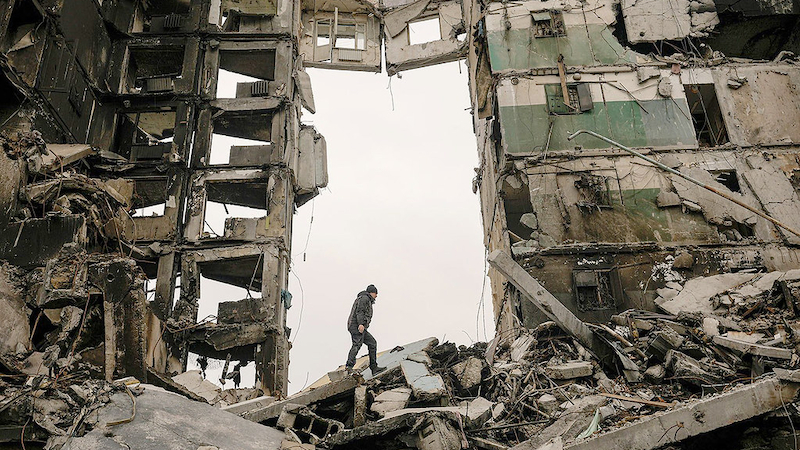
Unlawful Ukrainian Objectives: The War Crimes of Russia
By Lark Escobar, MALD 2022 Candidate, The Fletcher School
Not all acts of aggression are permissible in war, and the horrors of the Russian invasion of Ukraine are more than just the normal or lawful incidents and targets of violence in war. War crimes are grave criminal violations of international humanitarian law which can be grouped into three categories: crimes against peace, war crimes, and crimes against humanity.
Russia appears to be committing crimes in all three categories in Ukraine.
Crimes Against Peace:
Russia invaded Ukraine on Thursday, Feb. 24, 2022, thus committing a crime against peace by waging a war of aggression. Although Russia is promulgating a narrative that it “had no other choice” and was forced to invade to “de-Nazi-fy” Ukraine and liberate it from “neo-Nazis”, there is no evidence to support these assertions. There are no media reports, UN reports, or NGO reports from organizations such as Amnesty International or Human Rights Watch to indicate that there was any such crisis in Ukraine or any legitimate basis to justify Russia’s unlawful invasion.
War Crimes:
The Russian forces appear to be committing war crimes through their method of intentional targeting. It is unlawful in war to target civilians or civilian infrastructures such as theaters, schools, and hospitals, forcibly transfer or deport civilians, plunder public and private property, or engage in unnecessary destruction of cities, towns, or villages. There are several provisions that protect civilians, including the principles of proportionality, necessity, and warning. In other words, a military cannot target civilian infrastructure unless there’s a clear military necessity, and when they do they should warn civilians so the area is cleared and loss of civilian life is mitigated.
Another war crime is that of perfidy or pretending to be someone with protected status, such as a chaplain or medic, to stage a surprise attack. Eyewitness accounts in Ukraine allege that Russian forces, specifically the Chechnyan fighters, committed this crime in Kyiv on Feb. 27, 2022. It is also a war crime to torture civilians, treat them poorly, or enslave them, allegations of which are beginning to surface in Bucha, a suburb just outside of Kyiv.
Crimes Against Humanity:
Rape was recognized as a crime against humanity in the wake of WWII. Some of the most widely-reported allegations of Russian crimes against humanity in Ukraine are the rape and murder of Ukrainian civilians. Reports of gender-based violence include molestation and rape of Ukrainian women and girls. According to Common Article 3 of the Geneva Conventions, sexual violence in war is prohibited under the “violence to life and person,” “cruel treatment,” “torture,” or “outrages upon personal dignity.” The Fourth Geneva Convention expressly notes that “women shall be especially protected against any attack on their honor, in particular against rape, enforced prostitution, or any form of indecent assault.” Additional Protocol II further elaborates on the ban against “outrages upon personal dignity, in particular humiliating and degrading treatment, rape, enforced prostitution, and any form of indecent assault committed by any party.” These norms are reaffirmed by the Convention Against Torture. Another suspected crime against humanity that is occurring is the forced deportation of Ukrainian civilians. The mayor of Mariupol is also concerned about municipal officials being held hostage in No. 52 Penal Colony at Olenivka. In May 2022, Lyudmyla Denisova, Ukraine’s human rights ombudsman, alleged that “3,000 civilian ‘hostages’ are being held in the same walled penal colony–including police officers, activists, and 30 volunteers who were captured while taking aid to Mariupol.”
Summary execution without due process for civilians is also a crime against humanity and has been alleged to have occurred in the town of Bucha and in Chernihiv and Kharkiv.
These allegations are not exhaustive of all the reports of Russian atrocities and other inhumane acts that may be considered crimes against humanity. Across all of these cases, Russian war crimes are proving to be challenging to prosecute, even when the individuals carrying out these crimes are being ordered to do so by their superiors. The International Criminal Court, or ICC, announced it began an investigation into these potential war crimes in March of 2022. The ICC effort also investigates potential Ukrainian war crimes, as allegations of acts of aggression against captured Russian troops have surfaced from late March as well. Thus far, Russia remains uncooperative in the ICC investigation and has not made clear efforts to mitigate these violations.
Should Russia remain uncooperative, it could still face ramifications under universal jurisdiction. In situations where responsible states are unable or unwilling to conduct investigations in good faith or hold war criminals accountable, other states can do so under international law.
Universal jurisdiction may often be enforced when suspected war criminals travel abroad. Immigration declarations include a box that asks if the person migrating has ever committed a war crime. As most people would never admit to such a thing, people check the box for “no” and are later able to be prosecuted for immigration fraud. There is no direct historical precedent for Russian war crimes in Ukraine. Russia is not a member of the ICC, and the international community has invested significant resources and political support for Ukrainian defense. These early indicators suggest that there will be political will for Russian accountability internationally.
